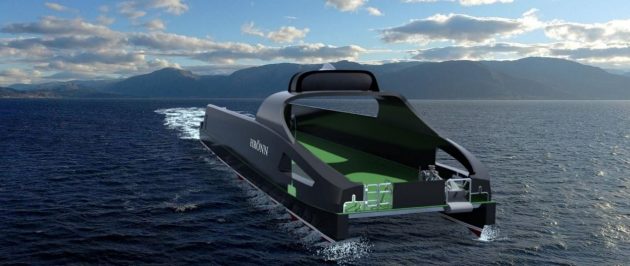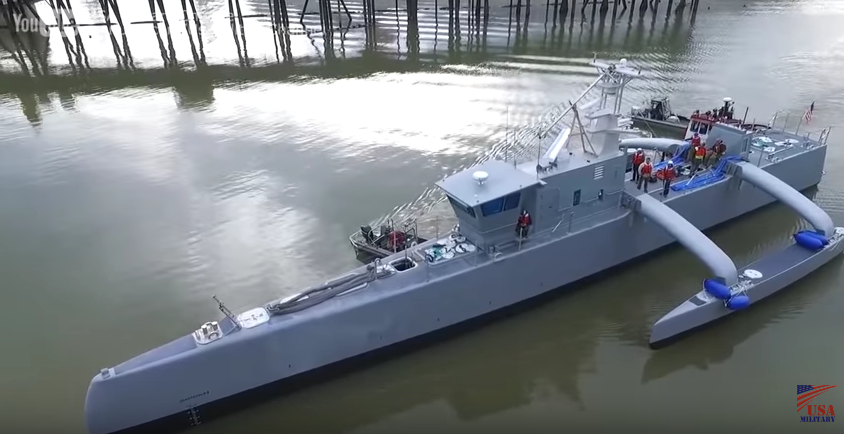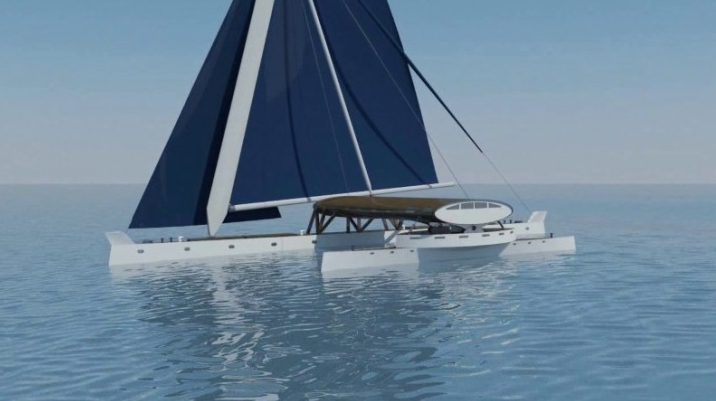Construction on Hrönn is expected to begin in January and will be the first full size unmanned ship to be built through UK and Norwegian co-operation.
First Rolls Royce announced it was heading a consortium to develop the technology for crewless boats to be controlled on land.
Then the Royal Navy began testing its new drone boat – MAST – on the River Thames.
Now, the Plymouth-based Automated Ships Ltd has announced that work will begin early next year on building the world’s first unmanned and fully-automated vessel for offshore operations.
Called Hrönn, the vessel will be designed and built in Norway in cooperation with Kongsberg Maritime.
The two companies have now signed a Memorandum of Understanding to build the ship.
Sea trials will take place in Norway’s newly designated automated vessel test bed in the Trondheim fjord and will be conducted under the auspices of the international certificiation body, DNV GL and the Norwegian Maritime Authority.
Offshore vessel Hrönn is expected to enter service in 2018.
KONGSBERG will deliver all major marine equipment necessary for the design, construction and operation of Hrönn.

View of the Hrönn. Credit: Automated Ships Lltd
The maritime technology manufacturer will provide all systems for dynamic positioning and navigation, satellite and position reference, marine automation and communication.
All vessel control systems including K-Pos dynamic positioning, K-Chief automation and K-Bridge ECDIS will be replicated at an Onshore Control Centre, allowing full remote operations of the Hrönn.
The light-duty, offshore utility ship will be servicing the offshore energy, scientific/hydrographic and offshore fish-farming industries.
Its intended uses include but are not limited to: Survey, ROV (Remotely Operated Vehicle) and AUV (Autonomous Underwater Vehicle) Launch & Recovery, light intermodal cargo delivery and delivery to offshore installations, and open-water fish farm support.
The vessel can also be utilised as a standby vessel, able to provide firefighting support to an offshore platform working in cooperation with manned vessels.
Automated Ships Ltd is currently in discussion with several end-users that will act as early-adopters and to establish a base-rate for operations and secure contracts for Hrönn offshore.

Render of the Hrönn. Building work is expected to begin in January. Credit: Automated Ships Ltd
Hrönn will initially operate and function primarily as a remotely piloted ship, but will transition to fully automated, and ultimately autonomous operations as the control algorithms are developed concurrently during remotely piloted operations.
Automated Ships Ltd said that currently, only small unmanned boats are being utilised for near shore operations but there are no technical limitations to constructing large, unmanned and automated systems.
“The only impediments are regulatory, but with the participation of DNV GL and the NMA, and Norwegian and UK companies and institutions, it will be possible to rapidly and at low-cost be the first to market with a full-size unmanned ship,” stated the company.
Managing director of the firm, Brett A. Phaneuf explained the benefits.
“The advantages of unmanned ships are manifold, but primarily centre on the safe guarding of life and reduction in the cost of production and operations; removing people from the hazardous environment of at-sea operations and re-employing them on-shore to monitor and operate robotic vessels remotely, along with the significantly decreased cost in constructing ships, will revolutionise the marine industry,” he said.
Upgrade for Sea Hunter – the US Navy’s 32ft submarine-hunting drone boat
The US Navy's 132-foot drone trimaran, Sea Hunter, which targets hard-to detect diesel-electric submarines, could be weaponised
Concept for zero emissions cargo ship unveiled
The Fair Winds Trading Company is in the research and design stage of the project. A model of the cargo…





